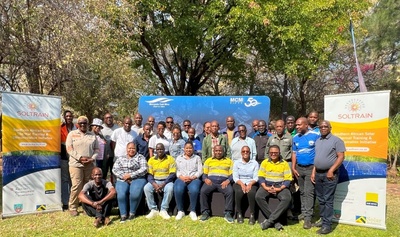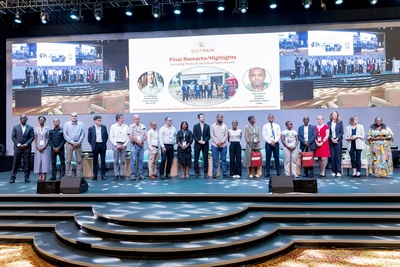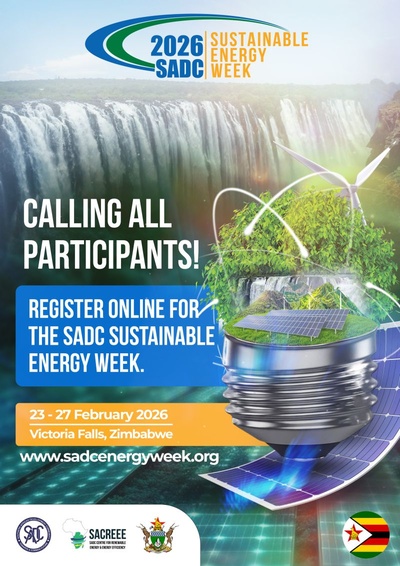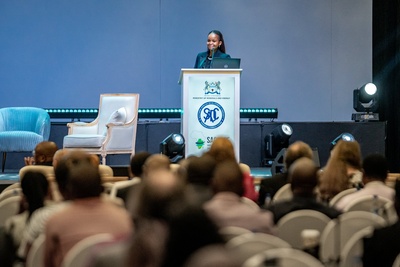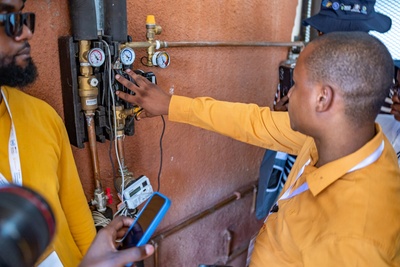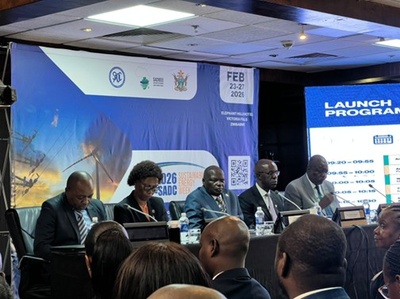Accelerating Energy Security in Southern Africa: Key Highlights from the 2024 SADC Sustainable Energy Week
Submitted by Selma FestusPublished 6 months, 1 week ago
The SADC Centre for Renewable Energy and Energy Efficiency (SACREEE), in collaboration with Botswana’s Ministry of Minerals and Energy and SADC Secretariat, successfully concluded the inaugural SADC Sustainable Energy Week. The 2024 SADC Sustainable Energy Week (SEW), held at the Gaborone International Convention Centre in Botswana, convened over 800 delegates from across the region and beyond under the theme “Accelerating Sustainable Energy Solutions for an Energy-Secure SADC Region.” The five-day event provided a dynamic platform for policymakers, development partners, financiers, and industry leaders to drive the regional energy transition agenda forward.
The event was supported by key partners such as the International Renewable Energy Agency (IRENA), United Nations Industrial Development Organization (UNIDO), Southern African Solar Thermal Training and Demonstration Initiative (SOLTRAIN+), and the Austrian Development Agency (ADA). This collaborative effort underscored the importance of partnerships in achieving inclusive, resilient, and sustainable energy systems.
The 2024 SADC SEW focused on key objectives to drive the region’s transition to a sustainable energy future. These included promoting investments in renewable energy and energy efficiency, addressing energy poverty with scalable off-grid solutions, and advocating for policies that support renewable energy adoption. The event also emphasised the importance of regional cooperation, knowledge sharing, and collaboration among governments, the private sector, and financial institutions. Highlighting gender and youth inclusion, SEW encouraged the participation of women and young entrepreneurs in shaping the energy landscape.

Day 1 : Ministerial Commitments and Regional Cooperation
Advocate Duma Gideon Boko, the President of the Republic of Botswana officially opened the inaugural SADC SEW with a call on SADC Member States and stakeholders to act in unity to achieve an energy-secure SADC region. “The time for talk is over. It’s time to act! Let’s work together to build a future where every home, business, and industry in SADC has access to clean, affordable, and reliable energy”, emphasised the President in his Keynote Address.
His Excellency Mr. Elias M. Magosi, the Executive Secretary of SADC, highlighted that energy security and universal access to energy remain critical catalysts for regional integration and true economic development across all sectors and Member States. H.E Magosi indicated that with approximately 600 million people in the Sub-Saharan Africa who do not have access to electricity, and out of which almost 172 million or 29%, are SADC citizens, there is need for partners in the energy sector to intensify the level of access to electricity by creating and embracing innovative financing mechanisms and alternative access solutions.
Day 2: Focus on Financing, Innovation & Off-Grid Renewable Energy
The sessions explored innovative financing mechanisms to unlock capital for green energy projects, session on electricity market innovation and grid integration, session on enabling the environment addressing the challenges and opportunities of transitioning towards smart, flexible, and resilient energy systems in SADC. The official opening for the 6th IOREC was opened by IRENA’s Director-General Mr. Francesco La Camera. The IOREC sessions discussed enabling policies, financing schemes, innovative business models and technology applications for scaling up off-grid renewable energy.
Day 3: Solar Thermal Solutions for the Region
The 8th SOLTRAIN+ Conference, held as part of the SADC SEW, showcased regional achievements in solar thermal technologies, including institutional solar water heating, energy storage, and capacity-building. The Gender Mainstreaming session featured a compelling keynote by Hon. Lesego Chombo, Minister of Youth and Gender Affairs, on women’s role in clean energy.
For full details on the SOLTRAIN+ Conference, including training sessions, technical tours, and speaker insights, see Kevin Nwaigwe’s article here.
Day 4-5: Global Perspectives & Technical Site Visits
The GN-SEC session brought together stakeholders from Africa, the Pacific, and the Caribbean. Final sessions covered topics including green hydrogen and e-mobility. Technical tours visited the University of Botswana and BITRI to demonstrate practical solar thermal systems in action.
Strong Outcomes and Recommendations:
Over the five days, the event achieved several key outcomes:
- Strengthened commitment among SADC Member States to harmonise policies and regulations for renewable energy and energy efficiency.
- Renewed support for regional projects the Regional Green Hydrogen Strategy.
- Clear emphasis on gender mainstreaming and youth engagement in sustainable energy development.
- Strategic partnerships are formed for capacity building, technology transfer, and innovative financing mechanisms.
Looking Ahead
The 2024 SADC Sustainable Energy Week not only fostered dialogue but catalysed action. As the region faces the dual challenges of climate change and energy insecurity, the event highlighted that sustainable energy solutions are both viable and essential for inclusive development.
In his closing remarks, Mr. Kudakwashe Ndhlukula, Executive Director of SACREEE, reiterated the Centre’s commitment to serve as a knowledge hub and coordination platform for regional energy initiatives. The next steps include tracking progress on commitments made, deepening collaboration with stakeholders, and preparing for the 2026 SADC SEW 2026 in Zimbabwe with renewed ambition.
In conclusion, SEW 2024 marked a significant milestone in the region’s energy transition journey. With the right investments, inclusive policies, and continued regional solidarity, a sustainable and energy-secure future for Southern Africa is within reach.


